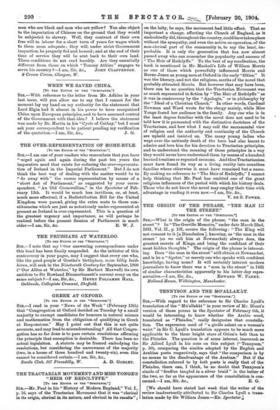THE TRACTARIAN MOVEMENT AND MISS YONGE'S "HEIR OF REDCLYFFE."
[To THE EDITOR OF THE "SPECTATOR."] SIR,—Mr. Paul in his "History of Modern England," Vol. I., p. 16, says of the Tractarian Movement that it was "clerical in its origin, clerical in its nature, and clerical in its results" ; on the laity, he says, the movement had little effect. That so important a change, affecting the Church of England, as it undoubtedly did, throughout the country, could have taken place without the sympathy, and even the active co-operation, of the non-clerical part of the community is, to say the least, im- probable. It is only the generation that has now almost passed away who can remember the popularity and success of " The Heir of Redclyffe." To the best of my recollection, the book is mentioned in Mr. Mackail's Life of William Morris as one of those which powerfully influenced Morris and Burne-Jones as young men at Oxford in the early "fifties." It was the literary, and not the religious, merits of the novel that probably attracted Morris. But however that may have been, there can be no question that the Tractarian Movement was as much represented in fiction by " The Heir of Redclyffe " as it was in controversy by the "Apologia," or in philosophy by the " Ideal of a Christian Church." In other words, Cardinal Newman and Ward wrote for the clergy mainly, while Miss Yonge found her audience in the family. Any one who is in the least degree familiar with the novel does not need to be told how it is permeated with the distinctive doctrines of the Tractarians, and how what I may call the sacramental view of religion and the authority and continuity of the Church are upheld and insisted on. The many young ladies who wept over the untimely death of the hero had also learnt to admire and love him for• his devotion to Tractarian principles, and to understand the meaning of those principles in a way they would never• have understood them by means of a hundred learned treatises or repeated sermons. And thus Tractarianisra must have found its way as a living reality into countless families where otherwise it must have remained but a name.. By making no reference to " The Heir of Redclyffe," I cannot help thinking that Mr. Paul has omitted one of the great religious influences of the period with which his history deals. Those who do not know the novel may employ their time with advantage in reading it even now.—I am, Sir, &c.,
V. DE S. FOWIKE.










































 Previous page
Previous page